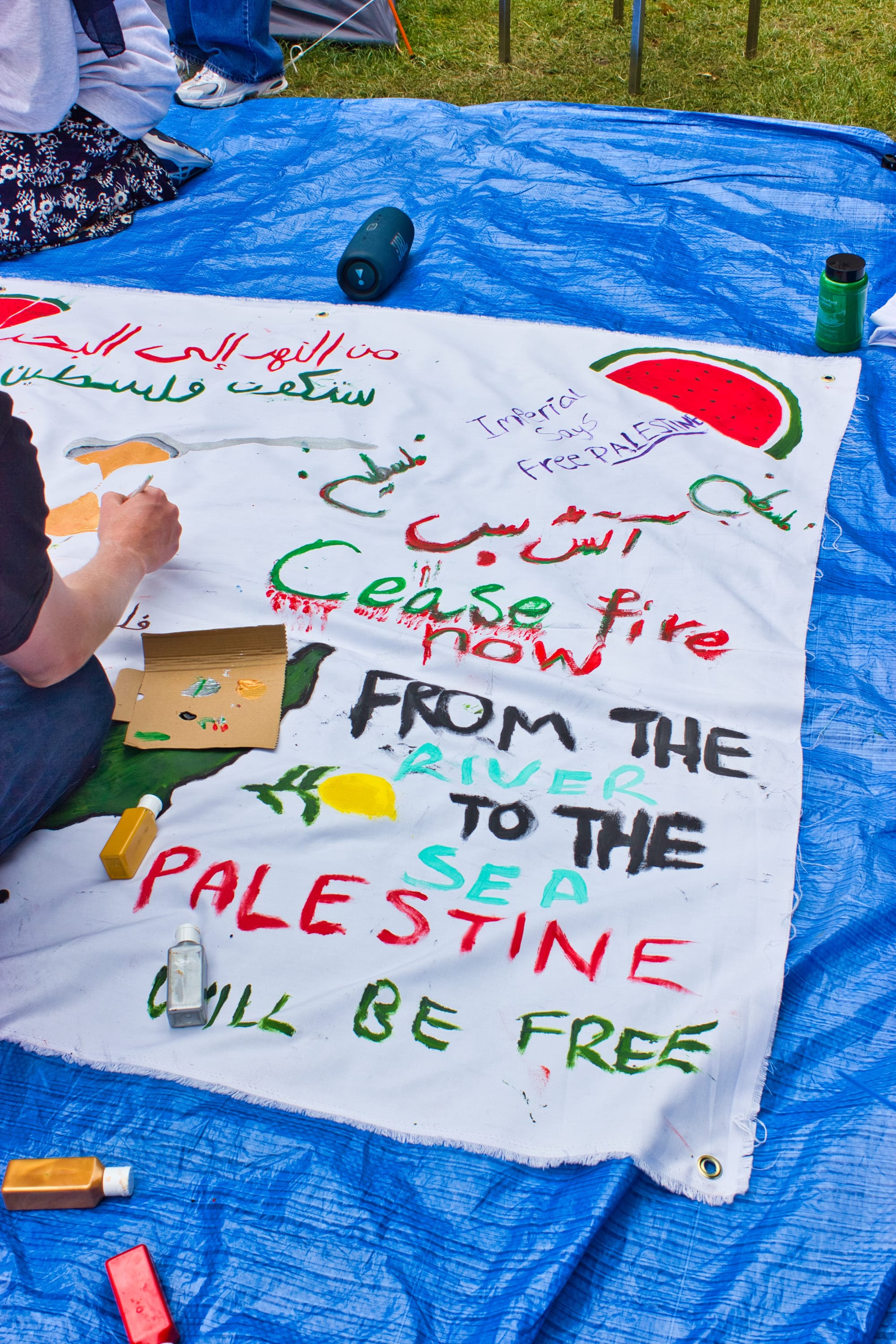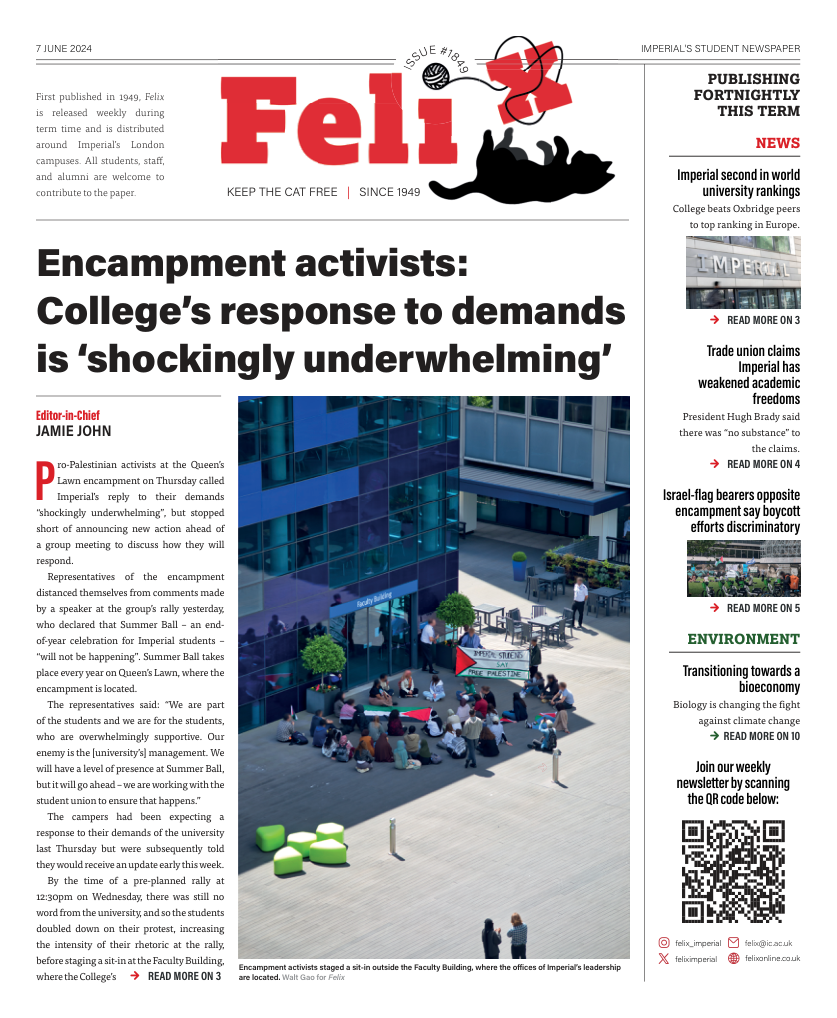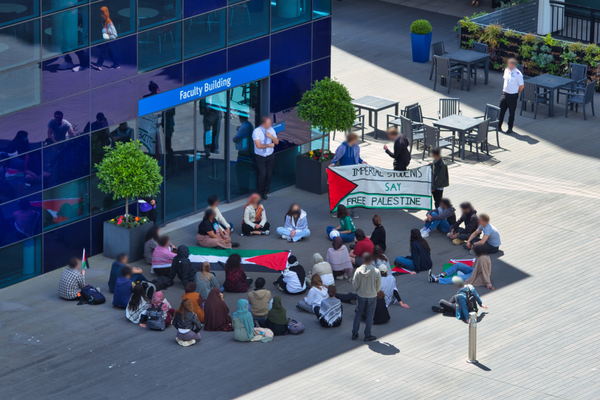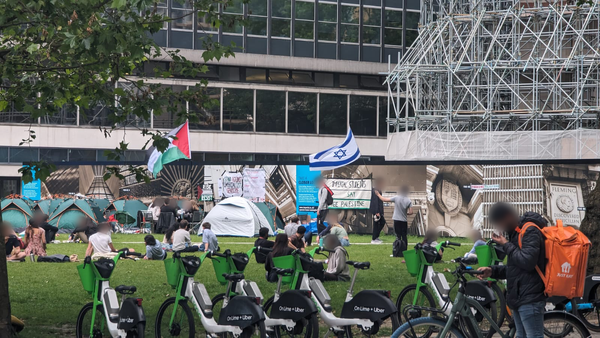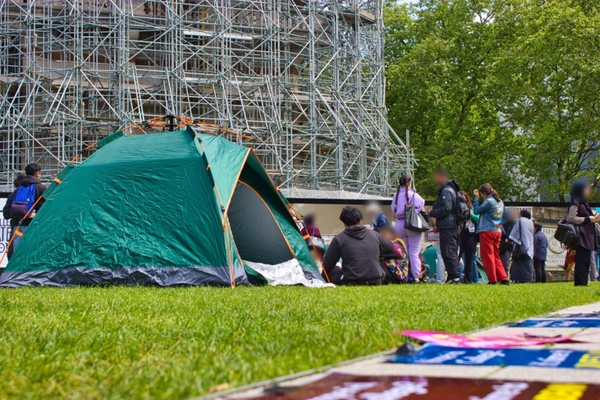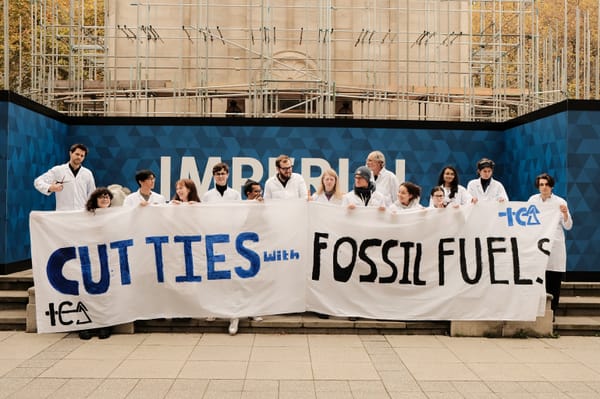“People care deeply about this”: two weeks at Imperial’s Gaza encampment
Felix sat down with an activist on Queen’s Lawn to learn how the encampment functions and what might come next.
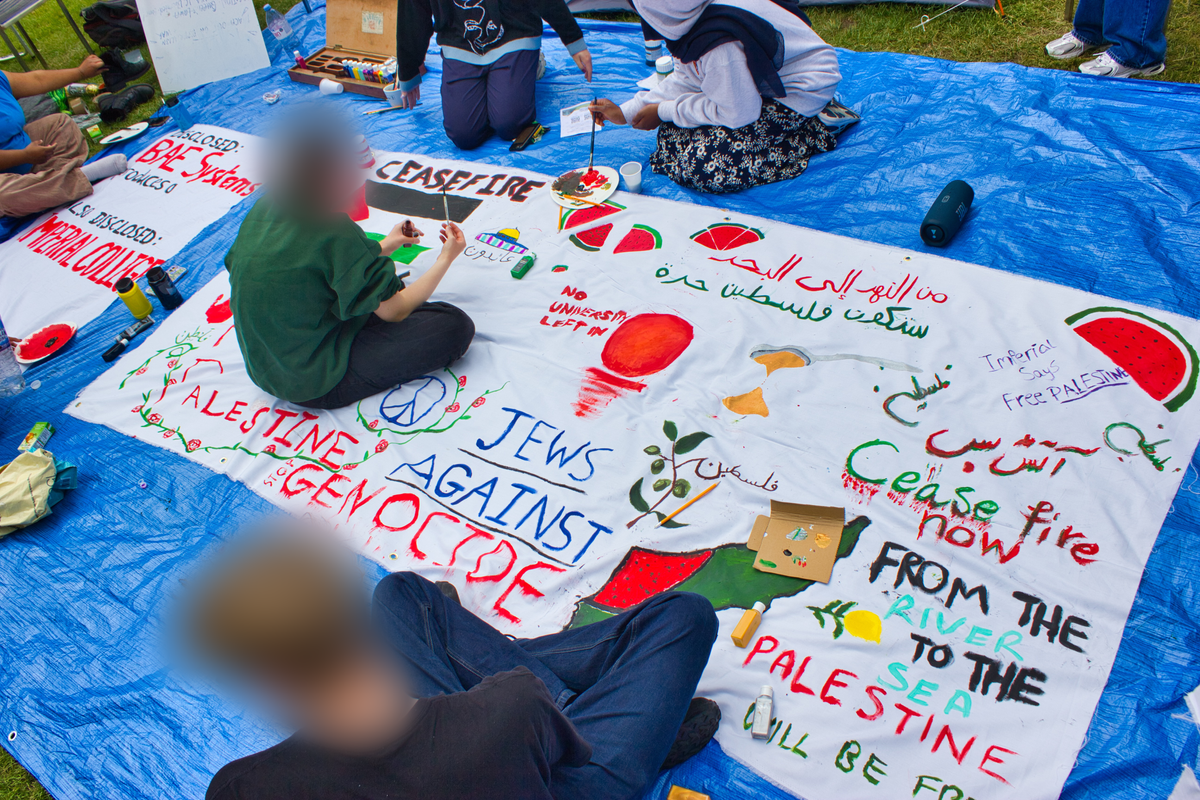
It has now been two weeks since students at Imperial walked across Queen’s Lawn and set up an encampment on the university’s South Kensington campus.
Since then, activists have busied themselves with a roster of events, ranging from teach-ins and rallies to poetry sessions and movie nights.
Today, on the afternoon of Monday 3rd June, a banner-making session is underway. Seven students sit in a clearing amid a small sea of tents and paint slogans onto large sheets of white fabric. In brushstrokes of red, green, and black – the colours of the Palestinian flag – the activists render their calls for a ceasefire and a free Palestine.
Under a gazebo a few metres away, donations pile up. Bottled water, fruit juices, olive oil, bananas, chewing gum, handwash, and cutlery sit crowded onto two tables, and an assortment of pots and plates is stacked nearby. Underneath one of the tables, a plastic storage unit is filled to the brim with canned food and pasta.
“We’ve had huge donations of food,” says George (not his real name), a student who has been a part of the pro-Palestinian movement at Imperial since October. “Especially things like snacks – there’s always, always snacks for people to eat.”
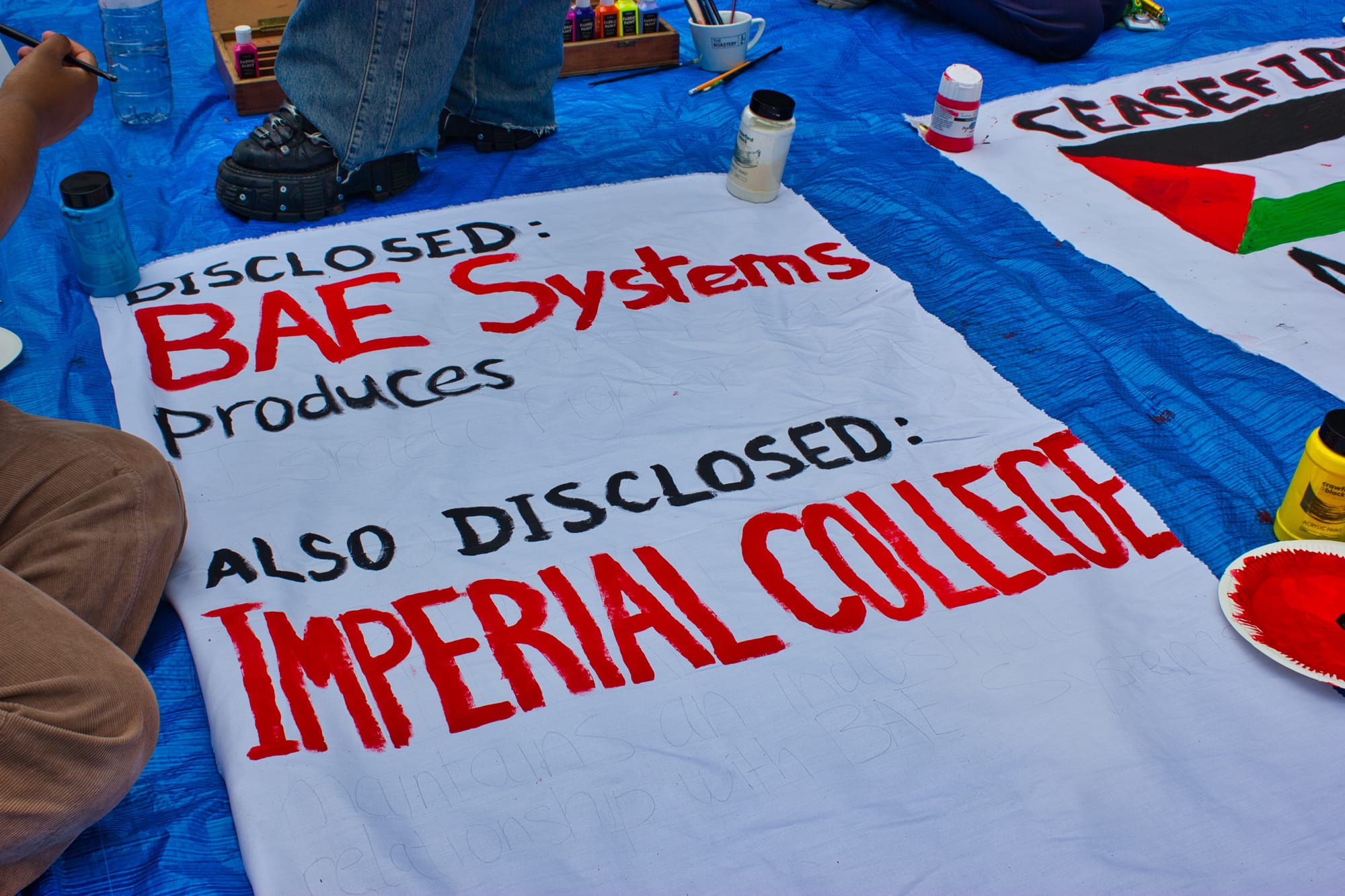
We are sat at the edge of the encampment, next to the paved pathway that cuts diagonally through Queen’s Lawn.
In the time since the encampment’s establishment, the number of tents has more than doubled, from 10 on 23rd May to over 20 on 3rd June.
George says that the increase is due to demand from students who have passed by and expressed an interest in joining.
“It’s been the most surprising thing, we’ve had to pick up seven or eight new tents,” he explains.
“At Imperial, you often feel that there’s a culture of apathy to what goes on in the world politically. Even recently, when we’ve done rallies, it’s been hard to connect with other people who care just because of how little time they seemed to have.
“But when we sit here, especially at lunchtime, people walk by and every 20 to 30 minutes, someone drops by to express support. People who I’ve never seen before care deeply about this and come out of the woodwork because we’re here all the time.”
The encampment’s Instagram account, which first posted on 23rd May, is approaching 1,000 followers at the time of writing. A GoFundMe created to solicit donations for food and camping supplies has raised over £3,000; £1,000 came from a single anonymous donor.
George says that being involved in the movement has been a big source of motivation “in all areas of my life”, including work. “Whatever I do, whether it’s research, academia, or another job, this movement has made me think: What’s the end result? What’s the outcome of the work that I do?
“Part of the reason we raise these demands is because there are ways to use science and what we learn at Imperial that don’t involve ending lives at an industrial scale. Of course my involvement takes up time, but it makes me feel more connected to the world and gives me energy that I never had – it’s rewarding.”
He disputes a claim made by a member of Imperial’s security staff, who said that while many tents were pitched, only around five people were present at the encampment overnight.
“We saw that and we genuinely don’t know where they get that number. We’re convinced they’re just counting the people that get up at night.
“We make sure someone is awake here at all times for security,” he explains. “So we have six people up at night – three shifts of two people.
“On any given night, there will be empty tents – like last night, there were two empty tents. But the absolute minimum we’ve had is 12 people, usually it’s around 18 to 20.
“There’s a core group of who are here three-quarters of the time, and then we have others who come for a couple of nights and then leave. Right now we have about the right amount of material for the number of people.”
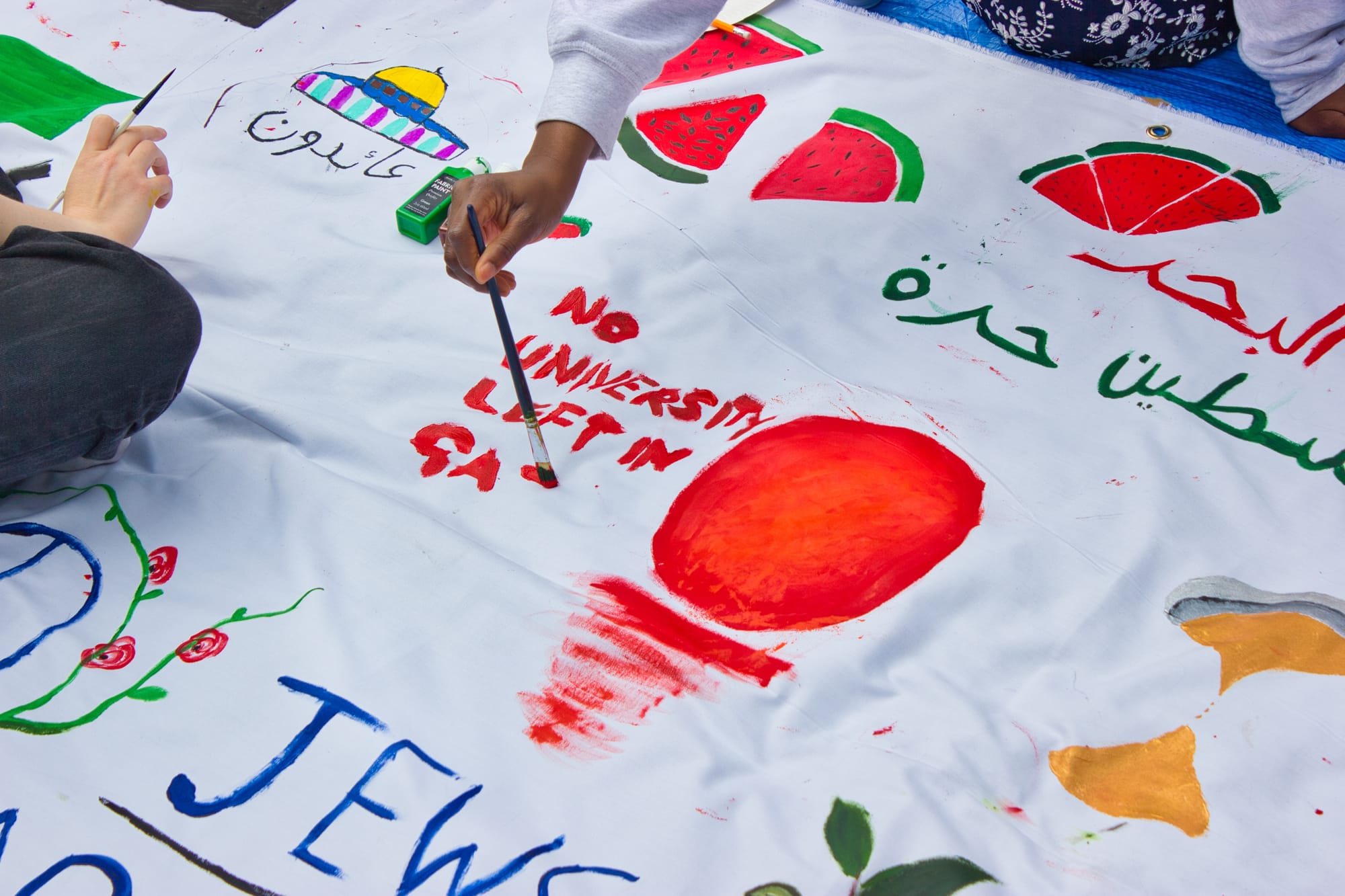
The encampment is managed by a series of five working groups – loosely organised groups of volunteers which each have their own group chat and are responsible for a single key function.
A welfare group keeps tabs on tents and food to ensure that capacity meets demand. The encampment’s internal security group manages night-time rotas and liaises with Imperial’s own security staff.
An outreach working group focuses on messaging “so that people understand why we’re here and how they can get involved.” The media team, by contrast, works on artwork, arranging banner-painting sessions like the one taking place today.
A fifth and final team – the events group – holds overall responsibility for the weekly timetable (“So when people want to do teach-outs or hold a film night, they make sure there are no clashes.”)
George says that the encampment is governed by consensus, and that those who want to take on more responsibility are allowed to do so. “Over the course of the week, people propose different events that they want to do. Then we get together in a group of 10 to 15 to ensure there’s no clashes and that there’s coverage of all the different things we want to talk about.”
“There are a few people in multiple working groups who talk to each other to ensure there’s a strategy and a collective response, but whenever there’s a bigger question we try to get everyone on the encampment together to see what people think.”
The welfare team seeks to provide at least one meal a day for inhabitants and implements a food rota to manage cooking and procurement.
George says that businesses – both local and in central London – have offered food, and people have brought cooked meals to the encampment. “For example, there was a group of women who came by and gave everyone cooked lunch.
“If something like that doesn’t happen, people either get snacks or we’ve cooked meals ourselves.
“There is stuff for people to eat breakfast and lunch as well, but it’s not a scheduled thing, so people go get food at work or eat at the cafeteria.”
The day after our conversation, someone from the farmers’ market on Imperial College Road brings paella for lunch.
Imperial has provided portaloos a short distance from the encampment, and there are toilets and showers in neighbouring buildings, so everything other than laundry can be done on campus.
“We’ve had a couple of people who live nearby who have taken laundry loads [for the encampment], but in the main, people bring a few days’ clothing and go back home to do their laundry.”
The group has developed an “onboarding process” for those who wish to join them, George says.
“We discuss our demands [of Imperial], our politics, our rules in terms of how we engage among ourselves and with the public. We have a document that outlines the minimum baseline we expect – tidying up, cooking and other expectations, how to deal with outsiders and engage them further.
“We explain how to give people information we think is important, to be friendly and open, and how to deal with anyone who is hostile – the priority is to protect people here. After that, we make sure they’ve got a place to sleep.”
George says that “anyone who agrees with our demands is welcome here,” but subsequently clarifies his statement.
Last term, Piers Corbyn, alumnus, anti-vaxxer, and conspiracy theorist attended a protest. IC Action for Palestine, which organised the event, later issued a statement saying Corbyn was not invited and that his views did not align with “the values of our actions and work.”
“Piers Corbyn would not be welcome on the encampment,” says George. “Despite what he might say, he doesn’t agree with our aims.” He adds that the same goes for those who espouse antisemitic beliefs – they would be told to leave.
The Imperial settlement is part of a wider phenomenon of ‘Gaza solidarity encampments’ that has swept across higher education institutions in the UK and US over the past few months. Students pitch tents in open spaces on campus and call on their universities to divest funds from businesses aiding the Israeli war effort in Gaza.
The encampments take inspiration from earlier protests such as the Vietnam anti-war demonstrations in the late 1960s, and the anti-apartheid movement in the 1980s, when student activists mobilised on campuses to voice their outrage and lobby for change.
The campus occupation movement soared to prominence two months ago after the president of Columbia University authorised the New York Police Department to clear an academic building that students had occupied. Riot police swarmed the surrounding streets, clashing with protestors and arresting over 100 of them.
In the wake of the events at Columbia, encampments were established on campuses around the UK, including Oxford, Cambridge, Manchester, Leeds, and a number of London universities.
Tensions have ratcheted up as Israel continues its assault on Rafah, a city in southern Gaza where civilians displaced by the war had initially been told to relocate.
The Israel Defence Forces say that Rafah is the last stronghold of Hamas, perpetrators of the 7th October attacks in which 1,200 people were killed and 252 others taken hostage.
Over 36,000 people have been killed in Israel’s retaliatory attacks on Gaza, according to Palestinian officials from the Hamas-run health ministry.
The campus demonstrations have elicited mixed responses from universities. At Brown University in the US, encampments were cleared after administrators agreed to put divestment calls to the institution’s governing body, which will vote on the matter in October.
Columbia University, which has taken a more strident stance on protests, cancelled its main graduation ceremony citing security concerns. The university will instead host a series of smaller ceremonies.
Closer to home, students at Goldsmiths in south-east London dismantled their encampment last month. After five weeks of occupation, the university agreed to demands including the provision of scholarships for Palestinian students, the publication of a statement calling for a ceasefire in the war, and a review of the institution’s use of the IHRA definition of antisemitism.
Fears of antisemitism are among the drivers of crackdowns on protest. The United States Congress has held a series of hearings on campus antisemitism, calling college presidents to testify. Congressional representatives excoriated the presidents of Harvard, MIT, and the University of Pennsylvania for their responses to the question of whether calling for the genocide of Jews violated rules on bullying and harassment. A protracted argument over Harvard president Claudine Gay’s response ultimately led to her resignation.
In May, UK Prime Minister Rishi Sunak met with university vice-chancellors and Union of Jewish Students president Edward Isaacs. Sunak said that ‘a small minority’ of people on campuses were ‘propagating outright harassment and antisemitic abuse.’
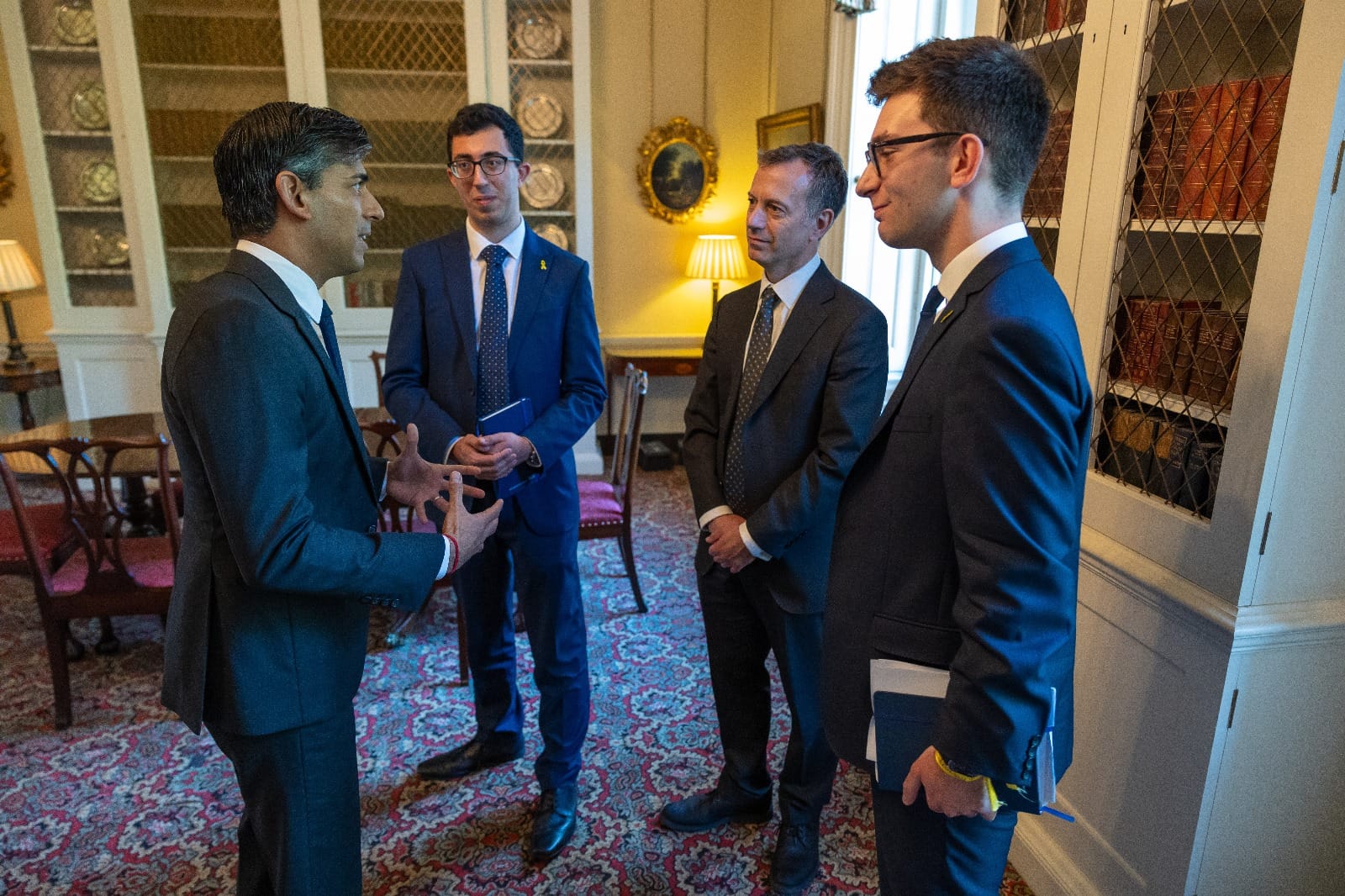
A day after the Imperial encampment was established, five students stood opposite the tents and waved an Israeli flag, accusing pro-Palestinian activists of discriminating by “singling out… the Jewish state for boycott”.
Activists at the encampment firmly rejected allegations of antisemitism, saying that ‘anti-racism’ was at the heart of their movement. The students added that ‘anyone of any faith or ethnicity’ was welcome to attend their events, provided they opposed ‘the slaughter… in Gaza.’
George, the student activist at Imperial, says that the group is in contact with protestors at universities around London. “Especially at UCL and SOAS, where they’ve faced significant attacks from both their administration and the outside. They’ve shared lessons with us to ensure we’re ready for that in future.
“We also try to support each other – so a lot of people at SOAS were involved in a demonstration at the Egyptian embassy last Friday. We sent people there to support them, because we’re much closer.”
Imperial’s response to the encampment has been “very hands off,” says George. “We feel like they’ve been working with us in good faith so far.
“However, we are very aware that some of their actions could be explained by them wanting to stall for time and dissipate the problem without actually addressing our concerns.
“We’re very happy to work with them, but it is also our job to understand where they might be looking to act as a pressure release valve without changing their behaviour.”
Interactions with security and other staff on campus have been “very constructive and positive”. “We work with security to make sure we aren’t making noise when people have exams and they helped sort us out with [portable] toilets.
“They’ve been very open with us about their concerns and how we can address them – and vice versa.”
Students at the encampment are awaiting an imminent response from Imperial on their demands – originally expected last Thursday, but later postponed to early this week.
Summer Ball, the flagship end-of-year event, is due to take place in just over two weeks. What happens if their demands are not met by then, and Imperial tries to remove occupiers by force? “There are people here willing to make a strong effort to stick around,” says George, adding that the encampment will remain “until our demands are met.
“I guess we’ll see what happens, but it’s our belief that it is far easier for the administration to meet our demands and satisfy pretty basic moral responsibilities, than to hire bailiffs to kick us out.”
